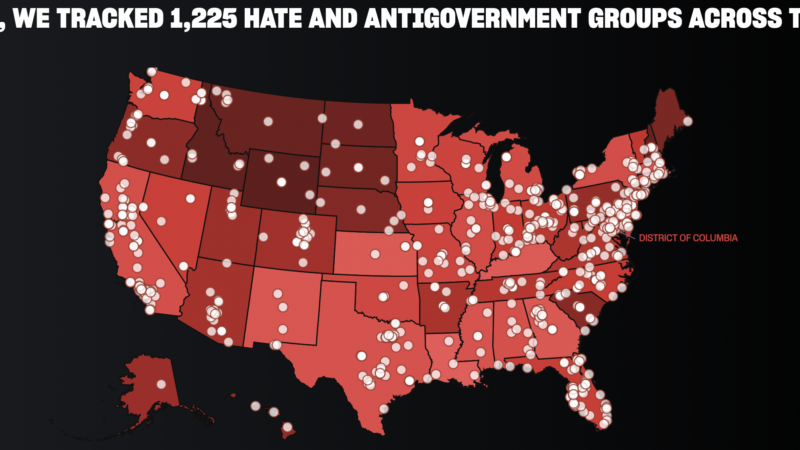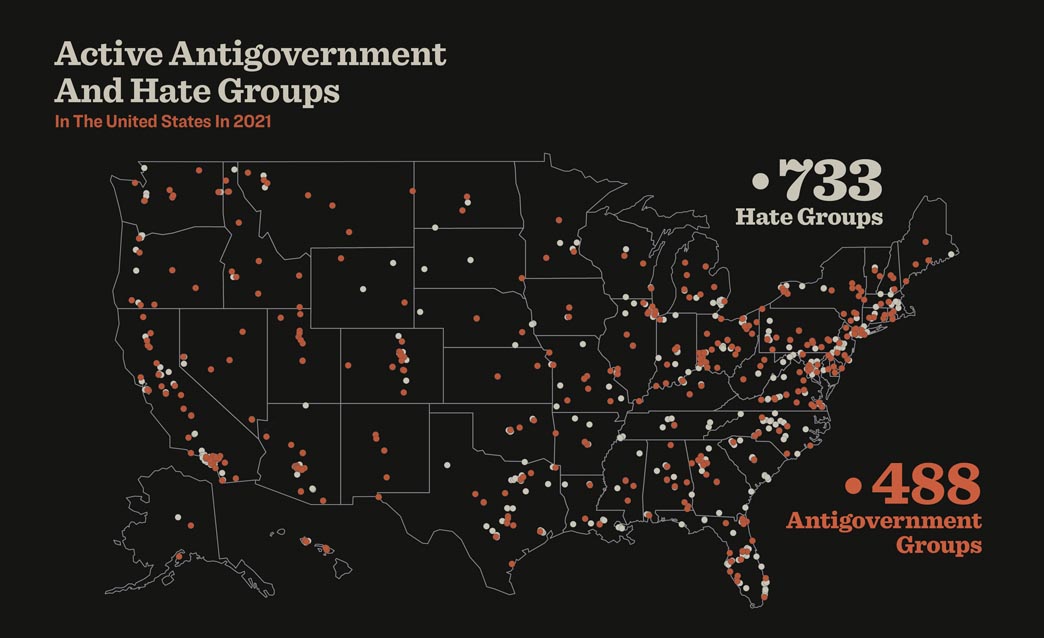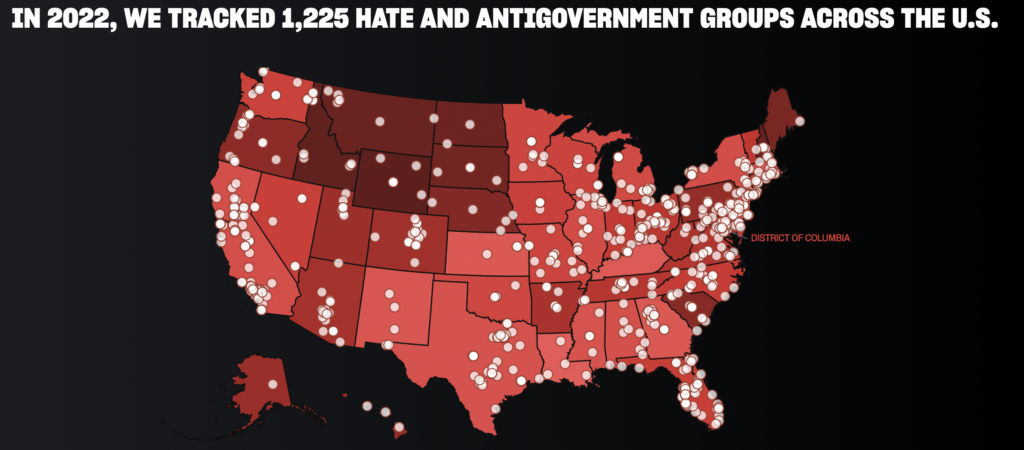The SPLC Is Massively Overcounting 'Hate' Groups—and It's Not Just Moms for Liberty
At this rate, the Southern Poverty Law Center's notorious hate map might eventually describe everyone as an extremist.

The Southern Poverty Law Center (SPLC) has released its yearly report on the number of hate groups in the U.S.—a number that is always rising, thanks to the watchdog organization's characteristically clever counting. By adding Moms for Liberty, a conservative grassroots organization that bears little resemblance to the neo-Nazi groups the SPLC has historically tracked, the 2022 report manages to set a new record.
The SPLC has long drawn criticism—not just from the right, but from libertarians and the left as well—for maintaining that hate in America is always growing, whether or not the ranks of the purportedly hateful are actually increasing. Its infamous "hate map" is representative of this problem: No matter how small and insignificant a hate group may be, it still counts toward the total number—and if it breaks apart because of infighting, it might end up counting as two groups on the next year's list.
Even so, the SPLC hit a snag in 2020: The overall number of hate groups in the U.S. had appeared to decrease slightly since the previous year, from 940 to 838. The following year, 2021, produced just 733 hate groups.
These findings would strike most people as good news, but they cut against the SPLC's long-documented goal of raising money by inspiring concern about rising levels of hate. (The Montgomery Advertiser's investigative report on this subject earned a Pulitzer Prize nomination in 1995.) So the SPLC got creative: The 2021 map includes not just the 733 hate groups but also 488 "antigovernment groups."

Historically, the SPLC had tracked alleged antigovernment groups as a distinct category, but the 2021 report said that antigovernment groups and hate groups had "converged around a willingness to engage in political violence, either inflict or accept harm, and deny legally established rights to historically oppressed groups of people."
Careful readers, however, would note that the overall number of antigovernment groups had declined since the previous year as well; while adding the two numbers—hate and antigovernment—together made for a more impressive total, the fundamental trajectory was downward. Not to be deterred, the SPLC observed: "Rather than demonstrating a decline in the power of the far right, the dropping numbers of organized hate and antigovernment groups suggest that the extremist ideas that mobilize them now operate more openly in the political mainstream." Heads they win, tails you lose.
The 2022 list makes practically no effort to distinguish between hate groups and antigovernment extremists. The most recent hate map lists 1,225 groups, which looks like a massive increase from the previous year, since the map's interactive function prompts viewers to compare it with 2021's 773 hate groups. Apparently, antigovernment groups are added and subtracted as necessary to produce the desired totals.

Among 2022's hate and antigovernment groups is Moms for Liberty, an organization that rallies right-wing parents who disagree with the curriculum and COVID-19 policies of public schools. This inclusion has prompted considerable pushback from the right; the group's co-founder, Tiffany Justice, rejected the "extremist" label, telling Fox News, "We are a group of moms and dads and grandparents and aunts and uncles, community members that are very concerned about the direction of the country."
The SPLC defends its description of Moms for Liberty as an extremist group by citing several members who have made violent threats against teachers and the LGBT community. It also cites statements that are not very extreme, including this one, from Justice:
"I raise my children. The government does not. We do not co-parent with the government. And there are certain sensitive subjects that we would like to be directing the conversation around for our children…Parents are very concerned about this idea about gender identity that was never discussed in our public schools, and it is now taking a front row seat in our children's education. And it is affecting everything they do, including for many of our girls, how safe they feel in the bathrooms at their school."
The SPLC clearly objects to the agenda of Moms for Liberty, which has advocated for the removal of books that discuss gender identity, racial identity, and sexuality from public school libraries. But the hate report draws little distinction between activities that could reasonably be described as hateful (i.e., violent and incendiary rhetoric toward the LGBT community) and normal, right-of-center political organizing. For instance, the SPLC also condemns Moms for Liberty for fighting against mask and vaccine mandates, seeking to abolish the Department of Education, and undermining the influence of teachers unions. If these stances are really sufficient to get an organization labeled "extremist," then the term extremism has lost all relevant meaning.
Luckily for the SPLC, Moms for Liberty is a chapter-based organization, which means that it can be counted not once but dozens of times. For example, the 2022 hate map lists 89 groups in Florida, 28 of which are Moms for Liberty. In Texas, Moms for Liberty constitutes 10 of the state's 72 extremist groups. No effort is made to distinguish these chapters based on whether prominent members have espoused genuinely hateful views; they're all just extremists, extremists everywhere.
The SPLC did not immediately respond to a request for comment.


Show Comments (113)